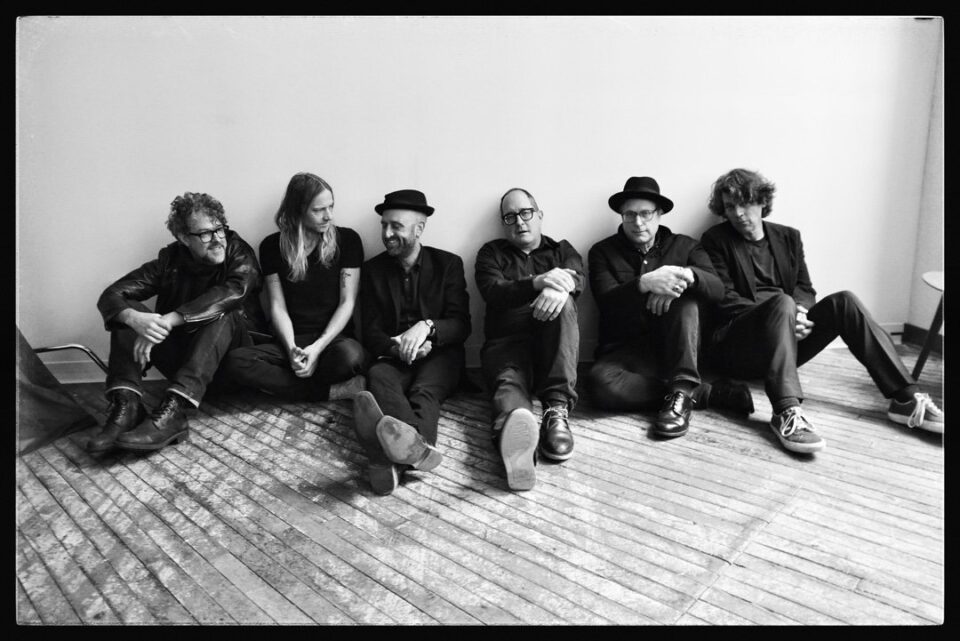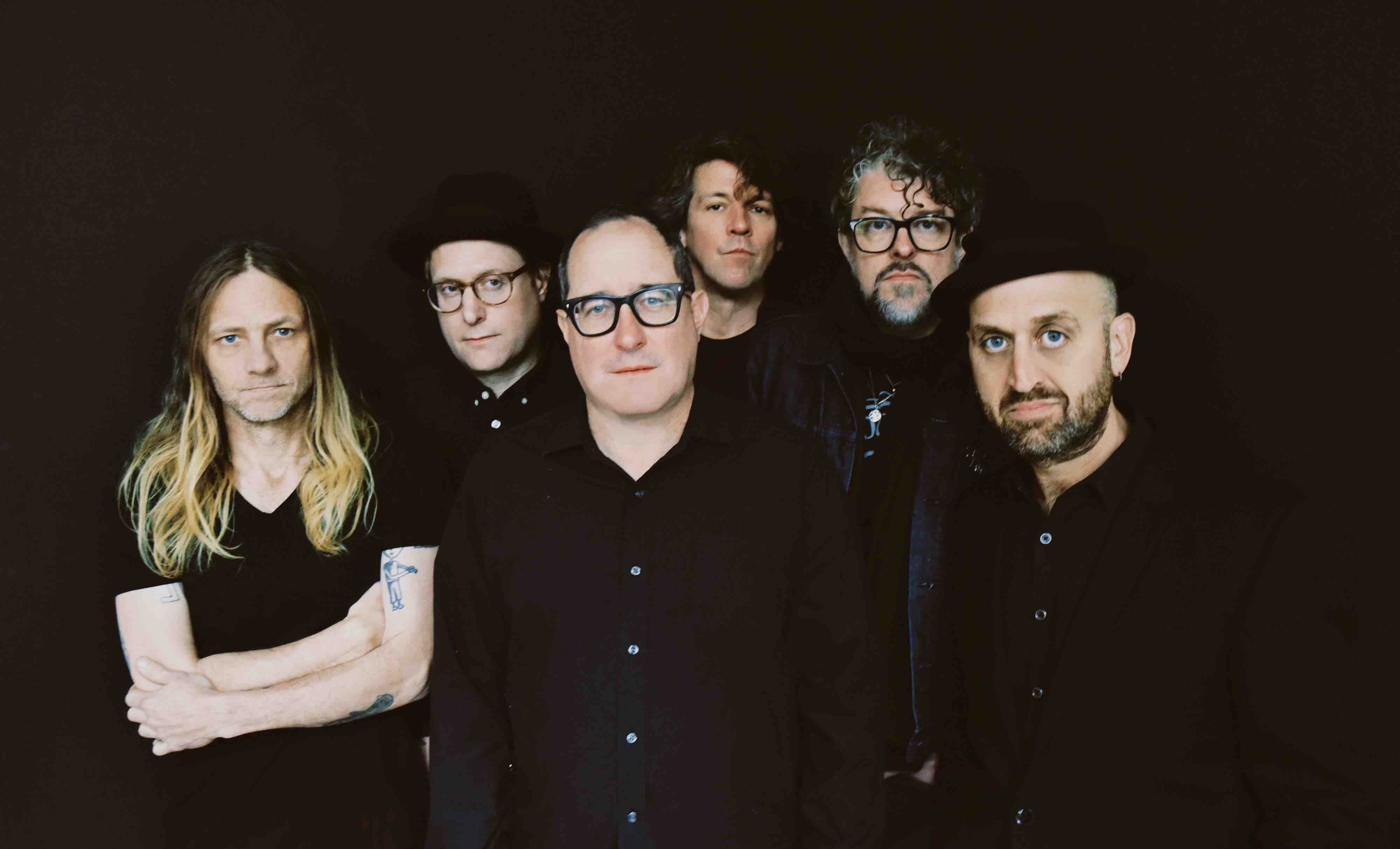It’s funny how naming something makes us more invested, whether it’s a stray cat that wanders into the kitchen one afternoon or a character who lives within the lyrics of a pop song. “I can see them better if I give them names,” says The Hold Steady’s Craig Finn. Recalling the moment he first noticed this proclivity, the lyricist explains: “When I was young I would listen to the Paul Simon record my parents had—‘Slip Slidin’ Away’ is the song—and in the middle of the first verse he says, ‘I know a man, he came from my hometown / He wore his passion for his woman like a thorny crown / He said Delores!’ And once he said ‘Delores,’ it all snapped into picture for me.”
You might call this The Hold Steady’s inciting incident. For 20 years, the band’s energetic riff rock has been the conduit for vivid, gonzo journalism–like character studies. The biblical epic Separation Sunday, for example, followed three Twin Cities denizens named Holly, Gideon, and Charlemagne as they navigated drugs, sex, and riverside brawls. Meanwhile, 2021’s Open Door Policy, mellower and more contemplative, found an affinity with traveling salesmen and hotel cleaners. As they enter their third decade as a band—with their spot in the pantheon of American indie rock institutions long secured—The Hold Steady continue to embrace their USP, and deliver their most focused, prescient album yet.
Populating The Price of Progress, the band’s ninth collection of dynamic rock and roll fiction, are the kinds of characters with whom you live and drink and rage—like the overworked, lonely young professionals of “Sixers,” whose fumbled meet-cute begets the close-to-home truth: “It’s hard to make friends when your job is so demanding.” Carlos, for one, is so plagued by stress and anxiety that he’s unable to work and pay the bills; he breaks down in front of his drinking buddies, soliciting some of the most empathic lyrics Finn has penned to date: “I love you, I feel you / I know that you’re hurting.”
Elsewhere, the soaring waltz “Grand Junction” follows a couple as they drive around the western United States, chasing sunsets and hoping to mend their relationship, which is on the rocks thanks to a ubiquitous online shopping conglomerate. (“I like having friends who check out and check in / So what if they send me some gifts?” Janie asks of her affronted partner.) “All these songs, when I look at them, they’re about where we’re at,” says Finn. “Everyone’s looking for a big score, rather than slow and steady.”
“All these songs, when I look at them, they’re about where we’re at. Everyone’s looking for a big score, rather than slow and steady.”
When not fronting The Hold Steady or crafting solo material, Finn hosts a podcast called That’s How I Remember It, which recently featured acclaimed fiction writer George Saunders on an episode. “One thing I noticed about Liberation Day”—Saunders’ latest work of dystopian, satirical shorts—“was something I thought ran parallel to our new record,” Finn continues. “It hits on this late-stage capitalism: the inequality, the way we work, what we do for money, and then our relationship with social media as well, and the way we connect through technology.”
Indeed, like Saunders, Finn ensures that each of his irreverent tales—like the one about the gambler who bets his lot on a University of Hawaii college football game because it’s the last one of the day—delivers an affecting insight into, as Finn puts it, “where we’re at.” For the gambler, that insight concerns self-belief: “If you chalk it up to luck, then you’re basically admitting / You don’t put much faith in your decisions.” For the itinerant couple of “Grand Junction,” it’s about connecting with another person despite capitalism’s intrusions. “In a song or a short story, one of the things you’re kinda going for is that perfect tension of what to put in and what to leave out; that’s something I’m always playing with,” Finn says, alluding to this equilibrium of humor, poignancy, and portent found in every Hold Steady song.

Much as The Price of Progress’s characters are adapting to where we’re at, The Hold Steady are, too. “In some ways it’s about streamlining,” says Finn. “With touring, maybe we aren’t gonna push as hard anymore to roll into a small market in the Midwest on a Monday night. We’ve done that.” In lieu of get-in-the-van hustling, the band has embraced residencies. Every year they host Massive Nights, a four-evening run at Williamsburg’s Brooklyn Bowl, during which they treat fans to deep cuts and guest appearances, and earlier this month they brought the same concept across the pond to Camden’s Electric Ballroom.
“It hits on this late-stage capitalism: the inequality, the way we work, what we do for money, and then our relationship with social media as well, and the way we connect through technology.”
“When we do these residencies, we aren’t tearing down the gear every night,” says Finn. “Instead of ‘How does this room sound? Is my amp still working?’ [soundcheck] is, ‘Hey, we should try and figure out how to play that song we haven’t played in nine years and get people excited tonight.’ So I think one of the things we’ve cut out in the past five-seven years is some of the extra non-musical stuff and allowed ourselves to pay more attention to what we wanna do musically. It’s a lot less travel-oriented and more musical; there are more musical conversations happening than [there would be] sitting in airports.”
And it’s clear from the new album that these musical conversations are propitious. While side A showcases the upbeat bangers fans have come to expect—see “Sideways Skull” and “Carlos Is Crying”—their spines are reinforced with tasteful string orchestration and a jaunty brass section. There’s more nuance and space, such as when “Sideways Skull” drops down to a sultry interlude complete with conga drums.
As for the album’s second half, Finn relates it back to where we’re at. “There’s this sort of unraveling, kind of a harrowing-ness to the B side,” he says. “There is something of late capitalism—going hard, going hard, and then falling off and unraveling.” Going further than capitalism’s intrusions, the characters’ lives start to be infiltrated by civil unrest (see “Distortions of Faith” and “The Birdwatchers”), and that unrest seeps down into the music. “The Birdwatchers,” for example, begins with an unsettled, minor key, almost Carpenter-esque vibraphone part, surrounded by ghostly guitar flourishes. Of course, this is still The Hold Steady, so chunky rock riffs and uplifting “la-las” soon come to the rescue—but the tone is set nevertheless.
“In a song or a short story, one of the things you’re kinda going for is that perfect tension of what to put in and what to leave out; that’s something I’m always playing with.”
For an album centered on distinctly modern conflicts, a close-to-home setting might seem the obvious choice. And yet, despite living in New York for the majority of his career, Finn says, “A lot of the songs on this record are very much West, like wide open spaces. I like that notion, that romance. The West really interests me…driving through the West has its own particular romance.”
It’s significant that while Finn and his band have, in many ways, reached a point of stability, even contentment—a solidified lineup, a long-standing relationship with producer and “great musical mind” Josh Kaufman—they remain concerned with nomadism, the West, the allure that drove them to name their breakthrough album after a line from Kerouac’s On the Road. “There’s this idea in this modern age of getting more space,” Finn explains, “and a lot of times what these characters find is, they go for more space, but they bring their problems with them.” It all comes back to their inciting incident—to that fateful Paul Simon record: “We work our jobs / Collect our pay / Believe we’re gliding down the highway / When in fact we’re slip slidin’ away.” FL







